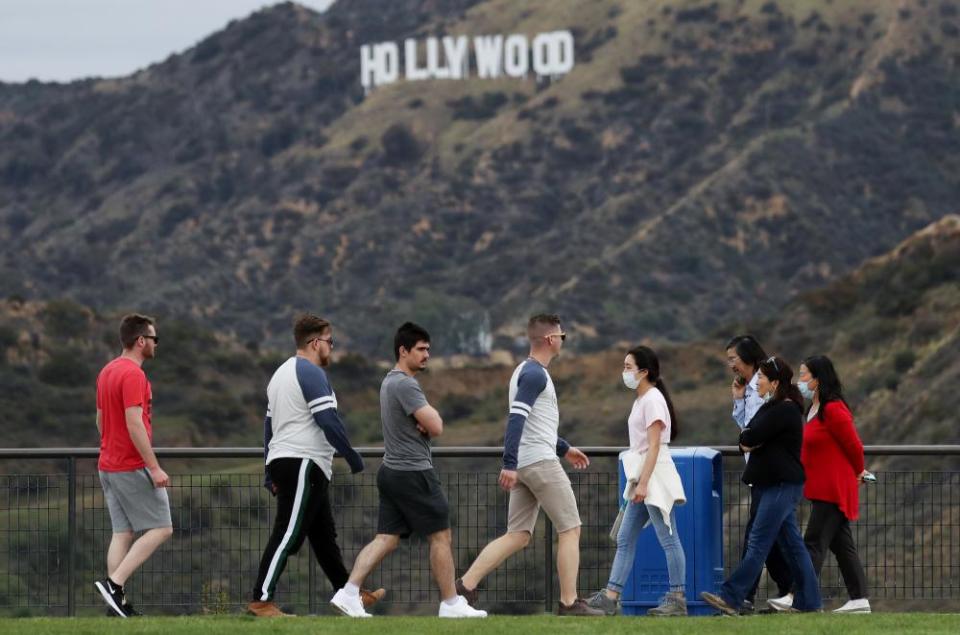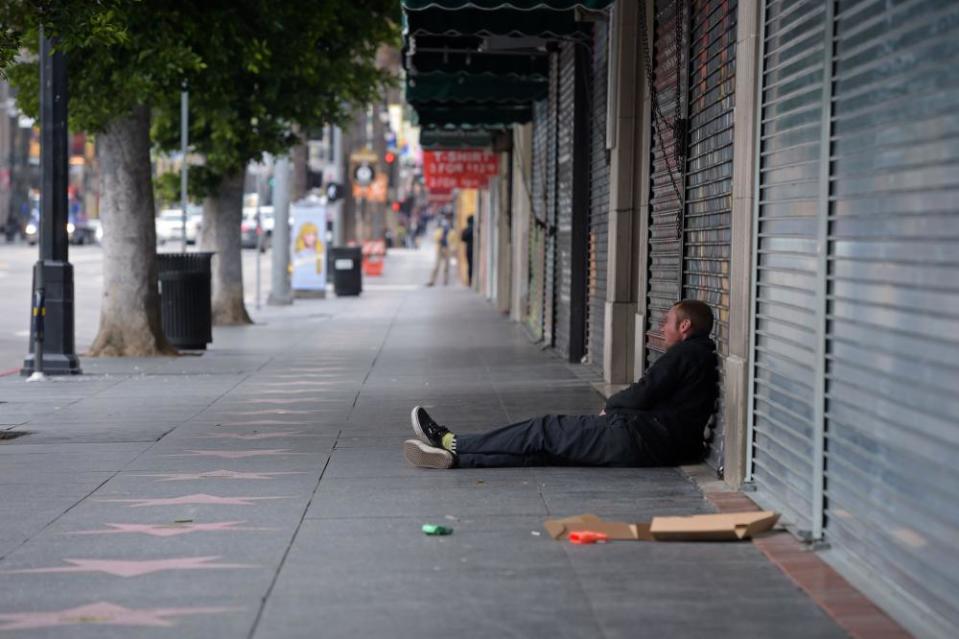'Like a bad sci-fi movie': life in a deserted Los Angeles under coronavirus
Across Los Angeles, the air is fresh and unpolluted, the freeways are empty and there’s plenty of parking. The unprecedented shutdown of the entire region feels like Christmas Day on repeat, except instead of staying at home to celebrate, people are staying inside to remain alive.
“It’s a ghost town,” said Gregory Johnson, 23, who was walking by the deserted Venice Beach boardwalk with his six-year-old daughter on Thursday, a week after LA closed all school campuses, shutting down the second-largest school district in the US. “Everybody’s paranoid. People are just terrified of even saying hello.”
The two had been watching nonstop TV, but now were hoping to find a taqueria that was still doing takeout, Johnson said as he squirted hand sanitizer on to his daughter’s hands: “I decided to come outside today with hella Germ-X.”
Los Angeles last week shut down all non-essential activities and ordered residents to shelter in place in an effort to slow the coronavirus spread. By Friday, the Covid-19 death toll in LA county had increased to 26, with more than 1,400 confirmed cases and projections of much worse to come.
“It feels like a bad sci-fi movie – like a Sharknado but it’s a virus,” said Kat Williams, a 35-year-old LA chef who runs a Jamaican catering business, but is now isolating and only going on brief neighborhood walks.

The tight restrictions in LA came after Bay Area officials enacted the country’s first shelter-in-place order and the same day California’s governor directed people across the state to stay home as much as possible.
Some Angelenos responded to the mass closures by taking a break at local beaches and popular hiking spots, creating crowds large enough that days later officials were forced to shut down access and close beach parking. At Griffith Park, with its views of the famed Hollywood sign, the city put plastic bags over public binoculars, eventually closed trails and sent police officers out on bikes.
“It feels weird,” said Andres Ralda, 23, wearing a wetsuit and on a break from surfing in Venice on Thursday. “It’s less crowded than usual, but everyone is out and about.” His restaurant business was now on hold and he didn’t want to stay inside his apartment for hours: “I’ve been surfing every day. But I try to keep my space. I don’t talk to people.”
Andres Ralda, 23, at Venice Beach. Has been surfing most days to get out of the apartment, but not interacting with anyone: "I try to keep my space. I don’t talk to people.”
He said it seemed like more people need to stay inside and stop hanging out in groups. pic.twitter.com/dTkdDg0qll— Sam Levin (@SamTLevin) March 27, 2020
Walking past the shuttered street vendors and ice cream stands along the boardwalk, Charles Melendez, 62, said he’s living out of his car nearby and hadn’t changed his routine: “The beach seems normal. It’s not like there are dead bodies in the street.” But, he added, “I can cross the street without getting hit by a car.”
With no end in sight to the shutdowns, restaurants workers, taco stand owners, actors, retail workers and others in this city that loves its dining, shopping and nightlife were coming to terms with the terrifying realities of lost wages and April rent.
“Everything is absurd and unstable,” said Sasha Jones, 32-year-old manager of Cuties, an East Hollywood queer coffee shop that has stayed open with limited hours. “I feel bad encouraging people to come in and shop. I know we’re all struggling right now, but people have been showing up.”
As an LGBTQ+ community space, it was sad to transition Cuties into takeout-only, she said: “ It’s hard when the regulars come in that I would usually hug. There’s this strange energy. Nobody knows how to move or be any more.”
Jones has been organizing meditation and other online events on Cuties’ Instagram in replacement of in-person events.
Williams, the Jamaican chef, who has done popups at Cuties, said they didn’t know how they would survive with their entire income gone overnight: “My landlord is giving me options, but none of them seem feasible.”
Williams is isolating with their girlfriend and her eight-year-old daughter, and they have been focusing on home-schooling and other home projects: “We’ve been borderline doomsday preppers. I’m reading a survival book and figuring out how to plant veggies in the backyard. I’m Jamaican, I’ve lived through natural disasters. I’m not trying to sleep on a pandemic.”
Lisha Brooks, an actor and writer, said she did two recent auditions by video (a normal practice during non-pandemic times), but noted that there was a lot of uncertainty about all future projects: “The weird thing about entertainment is you’re used to being home a lot and in between jobs.” While some artist friends were even expressing relief at the forced break from the grind, she said many were also terrified about bills and the possibility of eviction.
Brooks has been hosting virtual art classes as a way to pass the time, connect with friends and strangers, and force her out of pyjamas: “There’s a need to do something quasi-normal.”
For LA’s beloved street vendors, including the taqueros who set up informal taco stands, the sheltering rules have caused significant confusion, uncertainty and fear of a police crackdown.

“They don’t know whether they should stay open or what permits they need,” said Javier Cabral, editor of LA Taco, who has talked to food vendors across the city over the last week. Cabral, who worked as a producer on a Netflix taco docu-series, said he only went out once for tacos over the last week, realizing it’s just not safe: “What makes me most sad is I can’t support taqueros right now.”
The food writer said it was nice to see small and unusual acts of generosity. One restaurant forced to close recently gave Cabral a box of avocados, which he then handed out to random people on the street.
At Skid Row, the center of LA’s homelessness crisis where there are widespread concerns about a potential outbreak, Rocio Martinez, a 51-year-old resident of one of the shelters, said it felt like little had changed: “Nobody is on the bus, the traffic is lighter, but the area looks the same.”
But with libraries and workforce centers shut down, Martinez has struggled to continue her job search and is staying inside: “I feel a little claustrophobic and have lost track of time a bit. Is today Tuesday or Wednesday?”
At the world-famous Walk of Fame, Hollywood Boulevard was nearly empty except for a few people walking dogs or going on jogs.
“It’s nice to not be tripping over people,” said Andres Gutierrez, 28, a retail worker who lives nearby, after taking a photo of his dog in front of the empty Walk of Fame.
Desiree Parr, an artist walking with her dog and baby nearby, said she was on tour and taking time to focus on creative projects. “I’ve been staying inside and just learning and strategizing. There are a lot of self realizations coming about.”
The pandemic hasn’t killed tourism, entirely.
There are still tourists! Curtis Auble + his wife Heather came from Maryland on roundtrip flights that cost the couple $100 total. Hollywood hotel was $60 a night. It was their first-ever trip to California. “We’re the assholes who thought, why not travel?” pic.twitter.com/VAKRJ4OqE8
— Sam Levin (@SamTLevin) March 27, 2020
As a small group of three women in face masks took selfies outside the shuttered Museum of Selfies, across the street, Curtis Auble and his wife Heather were snapping shots of the Walk of Fame stars they recognized on their last day of vacation.
“We’re the assholes who thought, ‘Why not travel?’” said Curtis, 29, who said they came from Maryland earlier in the week on roundtrip flights that cost the couple $100 total. Their boutique Hollywood hotel was $60 a night, and it was their first-ever trip to California.
They enjoyed long walks along the beach and great food – even if it’s takeout only, said Heather: “We’ve tried a little bit of everything.”
“We figured we’d take advantage while we can,” added Curtis, who works at a restaurant with his wife. “I’m sure it’s usually 10 times busier here.”


